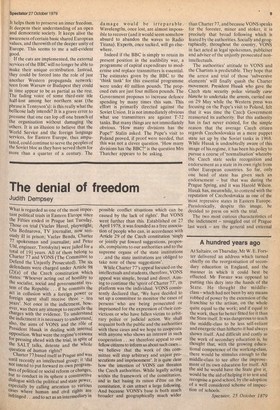The denial of freedom
Judith Dempsey
What is regarded as one of the most important political trials in Eastern Europe since the Fifties ended in Prague last Tuesday. Those on trial (Vaclav Havel, playwright; Ota Bednarova, TV journalist, now seriously ill in prison; Vaclav Benda, Charter 77 spokesman and journalist; and Peter Uhl, engineer, Trotskyite) were jailed for a total of 19i years. All of them belong to Charter 77 and VONS (The Committee to Defend the Unjustly Prosecuted). The six defendants were charged under Article 98 (2)(a) of the Czech constitution which states: 'Whoever acting out of hostility to the socialist, social and governmental systern of the Republic. if he commits the act in collusion with a foreign power or foreign agent shall receive three — ten years', Not once in the indictment, however, was there any attempt to reconcile the charges with the evidence. To understand the indictment it is necessary to understand,' also, the aims of VONS and the role of President Husak in dealing with internal oPposition. What were the regime's reasons for pressing ahead with the trial, in spite of the SALT talks, detente and the whole question of human rights? Charter 77 based itself in Prague and was until recently an intellectual group; it 'did not intend to put forward its own programmes of political or social reform or changes, but to conduct in its sphere a constructive dialogue with the political and state power, especially by calling attention to various cases where human and civil rights are Infringed . . .and to act as an intermediary in possible conflict situations which can be caused by the lack of rights'. But VONS went further than this. Established on 27 April 1978, it was founded as a free association of people who can, in accordance with Article 29 of the Czech constitution 'singly or jointly put foward suggestions, proposals, complaints to our authorities and to the supreme organs of the state institutions . . .and the state institutions are obliged to take note of these suggestions'.
. While Charter 77's appeal focused on the intellectuals and students, therefore, VONS appeal was simple, broad and direct. Aiming to continue the 'spirit of Charter 77', its platform was the individual. VONS consistently declared that, 'We have decided to set up a committee to monitor the cases of persons who are being prosecuted or imprisoned for the expression of their convictions or who have fallen victim to arbitrary police or judicial action. We shall acquaint both the public and the authorities with these cases and we hope to cooperate with anyone who shows an interest in such cooperation ...we therefore appeal to our fellow citizens to inform us about such cases... we believe that the work of this committee will stop arbitrary and unjust prosecutions and imprisonment'. It is quite clear how the intention of VONS can threaten the Czech authorities. While legally acting within the framework of the constitution, and in fact basing its raison d'être on the constitution, it can attract a large following. And because VONS's base is both much broader and geographically much wider


































 Previous page
Previous page